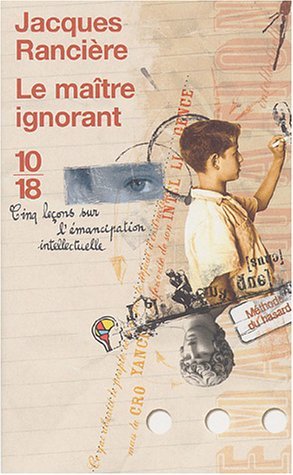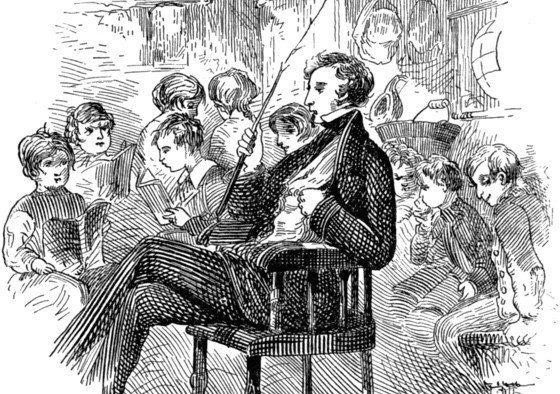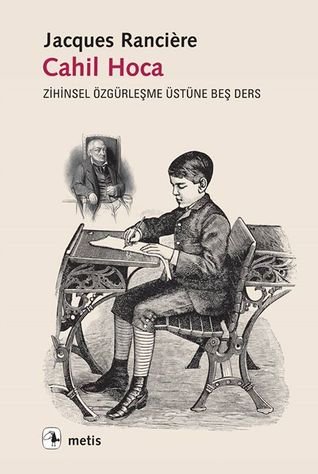
by Jacques Rancière.
Wednesday was a national holiday in Turkey, and my boyfriend and I decided to spend the afternoon on the balcony reading and sunbathing.
On the way to the balcony I chose a nonfiction among my boyfriend’s books resting on the coffee table.
My boyfriend is reading “The Buried Giant” by Kazuo Ishiguro.
What am I reading? Hmm, let me look at the title:
“The Ignorant Schoolmaster: Five Lessons in Intellectual Emancipation” by Jacque Rancière.
Wow.
IS WANTING ALL THAT IS NECESSARY FOR DOING?
I haven’t finished it yet, and I don’t think I will. But it might be the most inspiring book I’ve ever read -or started to read.
Rancière tells the story of Joseph Jacotot, an exiles French lecturer in French literature at the University of Louvain in Belgium. Jacotot didn’t speak Flemish, and most of his students didn’t speak French.
There was no common language between them.
How would he teach them anything?
At that time, a bilingual edition of “Télémaque” was being published in Brussels.
He had the book handed out to the students and asked them to study French through the translation. At the end, his students became fluent in French all by themselves.
He asked the students who had prepared as instructed to write in French what they thought about what they had read: He expected horrendous barbarisms, or maybe a complete inability to perform. How could these young people, deprived of explanation, understand and resolve the difficulties of a language entirely new to them? No matter! He had to find out where the route opened by chance had taken them, what had been the results of that desperate empiricism. And how surprised he was to discover that the students, left to themselves, managed this difficult step as well as many French could have done! Was wanting all that was necessary for doing? Were all men virtually capable of understanding what others had done and understood?
ALL PEOPLE ARE EQUALLY INTELLIGENT
Jacotot began thinking over the necessity of explication. It is taken for granted in any system of teaching, but is it really necessary?
We have schoolbooks consisting of a series of reasonings designed to make a student understand something. Why can’t a student learn directly from a book? Why does a student need a teacher to explain the book? Why should the book need that?
Instead of paying for an explicator, couldn’t a father simply give the book to his son and the child understand directly the reasonings of the book?
(…)
Has the student understood the reasonings that teach him to understand the reasonings? This is what the master has over the father: how could the father be certain that the child has understood the book’s reasonings?
Does it mean that we need teachers because they are the sole judge of our -and our children’s- comprehension? We need them because we need them to confirm and measure our progress.
Jacotot pondered the situation:
His students had learned French by themselves, so 1) You don’t need someone to teach you something in order to learn it.
He taught them French without sharing his knowledge with them, so 2) You don’t need to know something in order to teach it.
And finally he came to the most startling conclusion: 3) All people are equally intelligent. “Explication,” he writes, “ is the myth of pedagogy.”

UNIVERSAL TEACHING: REPETITION BY YOURSELF
As a result, he devised a method of teaching what he didn't know.
After all, anyone is capable of teaching anything, even subjects he/she doesn’t know.
And anyone is capable of learning anything, as long as that’s what she/he truly wants to learn.
Now, remember that we all learned something or another by ourselves, without any explanations or explicators. We all learned our mother tongue by observing and repeating. I have a few friends who also learned reading by themselves. And as far as I am concerned, they are no more geniuses than any of my other friends who were taught reading at school.
Intelligence’s act is to see and to compare what has been seen. It sees at first by chance. It must seek to repeat, to create the conditions to re-see what it has seen, in order to see similar facts, in order to see facts that could be the cause of what it has seen. It must also form words, sentences, and figures, in order to tell others what it has seen. In short, the most frequent mode of exercising intelligence, much to the dissatisfaction of geniuses, is repetition.
… like Racine, who memorized, translated, repeated, and imitated Euripides; Bossuet, who did the same with Tertullian; Rousseau with Amyot; Boileau with Horace and Juvenal; like Demosthenes, who copied Thucydides eight times; Hooft, who read Tacitus fifty-two times; Seneca, who recommended that the same book be read and reread; Haydn, who recreated six of Bach’s sonatas over and over; Michelangelo, who spent his time redoing the same torso again and again…
There is a lot to write about this, but if it intrigues you, I recommend you read the book and learn by yourself.
You don’t need an explication nor an explicator after all!
CAHİL HOCA [TR]

15 Temmuz’da resmi tatili erkek arkadaşımla birlikte evde, balkonda güneşlenip kitap okuyarak geçirmeye karar verdik.
Balkona yürürken erkek arkadaşımın sehpanın üzerinde duran kitaplarından birini elime alıverdim. O şu sıralar Kazuo Ishiguro’nun “Gömülü Dev” romanını okuyor.
Ben ne okuyormuşum? Durun bir kapağına bakayım:
Jacque Rancière, “Cahil Hoca – Zihinsel Özgürleşme Üstüne Beş Ders”.
Vay vay vay.
YAPMAK İÇİN TEK GEREKEN İSTEMEK Mİ?
Kitabı bitirmiş değilim, aslına bakarsanız bir gün bitireceğime de şüpheliyim. Yine de okuduğum veya okumaya başladığım en ilham verici kitaplardan biri olabilir – hakkını teslim edeyim.
Rancière, Belçika’daki Louvain Üniversitesi’nde Fransız edebiyatı okutmanlığı yapan Joseph Jacotot’nun hikâyesini anlatıyor. Joseph Jacotot buraya sürgünle gönderilmiş, tek kelime Flamanca bilmiyor; öğrencilerinin büyük bölümü de Fransızcadan bihaber.
Aralarında ortak bir dil yok.
Onlara nasıl bir şey öğretecek?
Tam o sırada Brüksel’de “Telemak”ın iki dilli bir edisyonu yayımlanıyor. Jacotot da bu kitabı öğrencilere dağıttırıp onlardan çeviriye baka baka Fransızca çalışmalarını istiyor.
Öğrencilerinden okudukları hakkındaki düşüncelerini Fransızca kaleme almalarını istedi. Korkunç uydurma ifadelerle, hatta tam anlamıyla bir acizlikle karşılacağını sanıyordu. Hiç açıklama görmemiş bu genç adamlar kendileri için yepyeni bir dilde karşılaştıkları güçlükleri sahil nasıl çözecek, metni nasıl anlayacaklardı ki? Hiç mühim değil! Önemli olan rastlantıya açılan bu yolun onları nereye götürdüğünü, bu çaresizlikten doğmuş ampirizmin ne gibi sonuçlar verdiğini görmekti. Fakat sonuçta öğrencilerin bu zorlu işin içinden birçok Fransız kadar iyi çıktıklarını görünce nasıl da şaşırdı. Yoksa başarmak için tek gereken istemek miydi? Her insan, başkalarının yaptığı ve anladığı her şeyi anlamaya potansiyel olarak kadir miydi?
TÜM İNSANLAR EŞİT DERECEDE AKILLIDIR
Jacotot eğitimde açıklamaların gerekliliği üzerine düşünmeye başladı. Bu her eğitim sisteminin tartışmasız belkemiğini oluşturuyordu. Ama gerçekten gerekli miydi?
Okul kitapları öğrencilerin bir konuyu anlamasını sağlayacak şekilde tasarlanmış bir dizi akıl yürütmeden oluşur. Peki neden öğrenci doğrudan kitaptan öğrenemez? Neden öğrencilerin bu kitabı açıklayacak bir hocaya ihtiyaçları var? Neden kitap bir açıklayıcıya muhtaç?
Baba birine sırf açıklasın diye para dökmek yerine kitabı oğluna verse, çocuk da dosdoğru o kitabın akıl yürütmelerini anlasa olmaz mı?
(…)
Öğrenci kitaptaki akıl yürütmeleri anlasın diye kendisine açıklanan akıl yürütmeleri anladı mı acaba? Hoca, babayı işte buradan yakalar: çocuğun kitaptaki akıl yürütmeleri anlayıp anlamadığını baba nereden bilsin ki?
Ne demek ki bu? Bir öğretmene ihtiyaç duymamızın tek sebebi, bizim -ve çocuklarımızın- bir konuyu kavrayıp kavramadığının tek karar vericisi olmaları mı? Onlara sırf ilerlememizi onaylasın ve ölçsünler diye mi ihtiyacımız var?
Jacotot durumu enine boyuna düşünür:
Öğrencileri Fransızcayı kendi başlarına öğrenmişlerdir, yani 1)Bir şeyi öğrenmek için onu size öğretecek birine ihtiyacınız yok.
Jacotot kendi bilgisini onlarla hiç paylaşmadan onlara bir şey öğretmiştir, yani 2) Bir şeyi öğretmek için onu bilmeye ihtiyacını yok.
Ve nihayet en çarpıcı sonuca ulaşır: Tüm insanlar eşit derecede akıllıdır. “Yorumlama/açıklama ihtiyacı,” yazar Jacotot, “pedogojik bir mit.
Böylece bilmediğini öğretmek için bir yöntem geliştirir.
Ne de olsa herkes her şeyi hatta bilmediği şeyleri bile öğretmeye kadirdir.
Ve yeter ki gerçekten istesin, herkes her şeyi öğrenmeye kadirdir.
Bu size tuhaf geldiyse, tekrar bir düşünün, sonuçta hepimiz açıklamaya ve açıklayana ihtiyaç duymadan bir şeyler öğrenmişizdir, değil mi? Her şey bir yana, hepimiz anadilimizi gözlemleyip tekrarlayarak öğrenmedik mi? Okumayı kendi başına çözen arkadaşlarım da var. Öte yandan bana sorarsanız okumayı okulda öğrenenlerden daha dâhi falan da değiller.
Zekânın edimi görmek ve gördüğünü karşılaştırmaktır. Önce rasgele görür. Gördüğünü yeniden görmek, benzer olgular görmek, gördüğünün nedeni olabilecek olgular görmek için gerekli koşulları tekrarlaması, yaratması lazımdır. Keza gördüğünü başkalarına söylemek için de kelimeler, cümleler, mecazlar oluşturması lazımdır. Kısacası, dehaların hiç hoşuna gitmese de, zekânın en sık görülen uygulama tarzı tekrardır.
… Racine, Euripides’i ezberleyip tekrarlamış, taklit etmişti; Bossuet aynısını Tertullian; Rousseau, Amyot; Boileau da Horatius ve Juvenalis için yapmıştı. Demosthenes, Thucydides’i sekiz kez kopyalamış; Hooft, Tacitus’u elli iki kez okumuş; Seneca aynı kitabı sürekli yeniden okumayı tavsiye etmiş; Haydn, Bach’ın altı sonatını sayısız kez tekrarlamış; Michelangelo aynı büstü yeniden yapıp durmuştu…
Bu konuda yazacak / anlatacak o kadar çok şey var ki. Ama eğer ilginizi çektiyse kitabı okumanızı ve tek başına öğrenmenizi öneririm.
Ne de olsa açıklamaya ve bir açıklayıcıya ihtiyacınız yok!
Bu yazı Curation Collective Discord Sunucusundatopluluk witness'ı olarak faaliyet göstermektedir. Projemizi desteklemek isterseniz bize buradan witness oyunuzu verebilirsiniz.
Curation Collective Discord community
community witness. Please consider using one of your witness votes on us here küratörlere önerilmiş ve manuel inceleme sonrasında @c2-turkish topluluk hesabından oy ve reblog almıştır. @c-squared hesabı This post was shared in the #turkish-curation channel in the for curators, and upvoted and reblogged by the @c2-turkish community account after manual review.@c-squared runs a
Congratulations @ecotone! You have completed the following achievement on the Hive blockchain and have been rewarded with new badge(s) :
You can view your badges on your board And compare to others on the Ranking
If you no longer want to receive notifications, reply to this comment with the word
STOPDo not miss the last post from @hivebuzz:
Support the HiveBuzz project. Vote for our proposal!